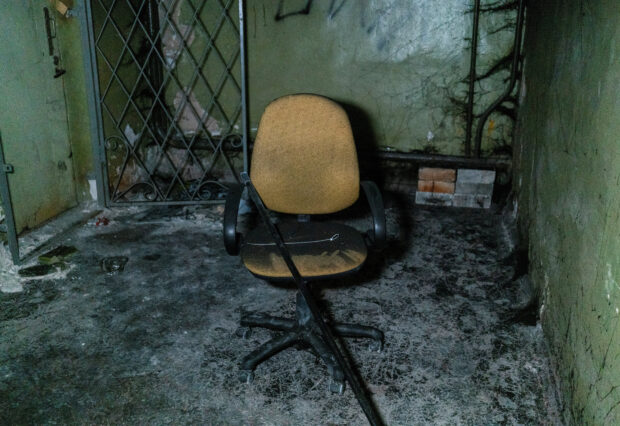Torture, sexual violence commonly used by Russian forces in Ukraine, say experts

Plastic ties for torture and a broken chair are seen inside a basement of an office building, where prosecutors say 30 people were held two months during a Russian occupation, amid Russia’s attack on Ukraine, in Kherson, Ukraine, December 10, 2022. REUTERS FILE PHOTO
AMSTERDAM — A large number of prisoners held in makeshift detention centers in Russian-occupied southern Ukraine were tortured and sexually violated, a team of international experts said on Wednesday in a summary of their latest findings.
The Mobile Justice Team, established by the international humanitarian law firm Global Rights Compliance, has worked with Ukrainian war crimes prosecutors in the Kherson region since it was reclaimed in November after more than eight months under Russian control.
Ukrainian authorities are reviewing more than 97,000 reports of war crimes and have filed charges against 220 suspects in domestic courts. High-level perpetrators could be tried at the International Criminal Court (ICC) in The Hague, which has already sought the arrest of Russian President Vladimir Putin.
The Kremlin has consistently denied allegations of war crimes in Ukraine by forces taking part in a “special military operation” it says was launched to “de-Nazify” its neighbor and protect Russia.
The Mobile Justice Team’s latest report, funded by Britain, the European Union and the United States, analyzed 320 cases and witness accounts at 35 locations in the Kherson region.
Article continues after this advertisementOf the victims’ accounts reviewed “43% explicitly mentioned practices of torture in the detention centers, citing sexual violence as a common tactic imposed on them by Russian guards”, a statement said.
Article continues after this advertisementIn June, Ukrainian prosecutors brought their first case over the alleged deportation of dozens of orphans from Kherson, charging a Russian politician and two suspected Ukrainian collaborators with war crimes. They provided no immediate comment to the latest findings on torture.
Waterboarding, beatings
Reuters reported in January on the scale of alleged torture in Kherson. Ukrainian authorities said at the time that around 200 people had allegedly been illegally held. Survivors told Reuters about tactics, including electric shocks and suffocation.
At the time, the Kremlin and Russia’s defense ministry did not respond to Reuters’ questions, including about alleged torture and unlawful detentions.
“The true scale of Russia’s war crimes remains unknown,” Anna Mykytenko, senior legal adviser at Global Rights Compliance, said of the latest findings on torture.
“But what we can say for certain is that the psychological consequences of these cruel crimes on Ukrainian people will be engrained in their minds for years to come.”
At least 36 victims interviewed by prosecutors mentioned the use of electrocution during interrogations, often genital electrocution, as well as threats of genital mutilation. One victim was forced to witness the rape of another detainee, the report said.
Detainees most likely to undergo torture were military personnel, it found, but also law enforcement, volunteers, activists, community leaders, medical workers and teachers. The torture techniques most commonly used were suffocation, waterboarding, severe beatings and threats of rape, it found.
Reuters was unable to verify the allegations.
All told, the evidence from liberated detention centers “suggests that Putin’s plan to extinguish Ukrainian identity includes a range of crimes evocative of genocide”, said British Barrister Wayne Jordash, who headed the team.
RELATED STORIES
International legal experts assist Ukraine in sexual violence investigation
EXPLAINER: How are war crimes in Ukraine being investigated?